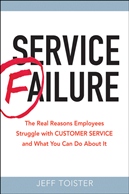Three things small business owners need to know about Yelp
 Jeff Toister
Jeff Toister  Monday, February 27, 2012 at 3:37PM |
Monday, February 27, 2012 at 3:37PM | What do you think of Yelp? Some business owners love it while others hate it. But like it or not, your customers are using consumer rating sites like Yelp to make decisions about your business. They’re filling out their own customer service surveys for the world to see, and other customers are deciding whether or not to give your business a try on the strength of those reviews.
If you are a small business owner, you should understand three things about Yelp.
#1 Yelp Drives Business
I was recently chatting about Yelp with Tara Julian, the owner of Hair Play, while she gave me a haircut. She mentioned that if you Google “best men’s haircut in San Diego” the first search result directs you to a Yelp page with Hair Play Salon at the very top. Tara joked that she didn’t know if she truly gave the best men’s haircut in town, but she knew she did a good job and works hard to take good care of her clients. Yelp was how I had found Hair Play myself, and I’ve certainly found Tara deserving of the five star rating so many clients have given.
Good reviews drive business. A 2011 study by Michael Luca at the Harvard Business School estimates that a one star increase in a Yelp rating generates a 5 – 9% increase in revenue for a small restaurant. (Read the study here.) While his study was limited to restaurants, consumers turn to Yelp to decide where to get their hair cut, find a garage door repair service (thanks Up and Down Garage Doors!), or find a housekeeping service (thanks Pure Cleaning Agency!).
What’s the best way to earn good reviews on Yelp? Make sure you consistently take great care of your customers. Which leads to #2…
#2 Yelp Provides Feedback
The beauty and bane of Yelp is the unvarnished, public feedback that customers post alongside their reviews. Some business owners feel that people only write reviews on Yelp to complain or support their friends’ businesses, but in between the flowery praise or angry rants are often some very useful points of feedback. Look at the most consistent comments made about your business, both good and bad, and you’ll see a fairly accurate picture of what your company looks like through your customers’ eyes.
For example, if you look carefully at the comments reviewers have made about Pure Cleaning Agency, you’ll notice people who give them great reviews tend to really like the person who cleans their home. My wife and I are definitely in this boat and have relied on the same terrific house keeper for a couple of years. The bad reviews are typically written by someone who had a bad experience on their first visit. Clearly, success at Pure is linked to making a positive first impression.
What’s the best way to use customer feedback? Act on it! Which leads to #3…
#3 Yelp Can Help Solve Problems
Feedback that consistently points to a similar problem should prompt small business owners to make necessary improvements to improve service. For example, Pure may want to look for ways to make sure the first visit with each new customer is spectacular. If this is their achilles heel, then getting better in this area will help them convert more first-time customers into long-term fans.
Individual reviews can also provide an opportunity to rectify specific customer service issues. Yelp allows business owners to respond to customer comments, and savvy owners take advantage of this feature. A best practice is to reply to an upset customer, apologize for their poor experience, and offer to contact them privately to discuss a solution. One caveat here – avoid turning a customer service response into a customer confrontation. It’s always bad to argue with a customer, but it really looks bad when that argument takes place via a website that’s accessible to the public.






